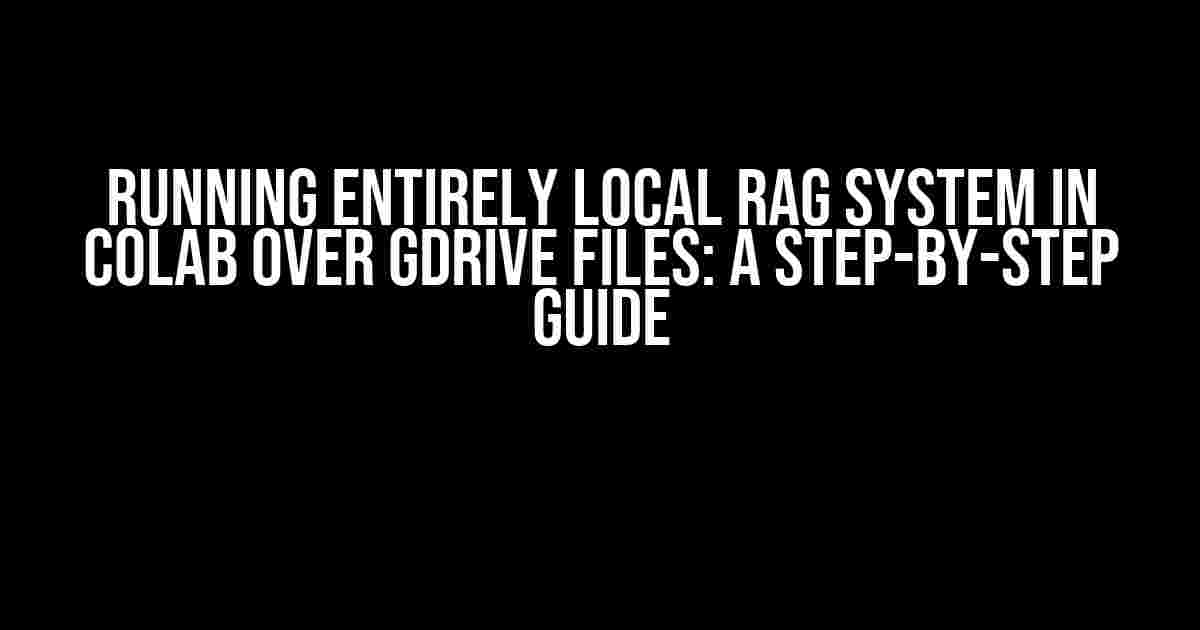Are you tired of dealing with the limitations of Google Colab’s online environment? Do you want to run your RAG system entirely locally, but still utilize the power of Google Drive for storing and accessing your files? Look no further! In this comprehensive guide, we’ll walk you through the process of setting up a local RAG system in Colab, using GDrive files as your storage solution.
What is RAG?
RAG, or Rapid Automatic Generation, is a powerful tool for data scientists and machine learning enthusiasts. It allows you to generate high-quality datasets and models with minimal effort, making it an essential component of many data-driven projects. However, running RAG entirely locally can be a challenge, especially when working with large datasets. That’s where Google Colab and Google Drive come in.
Why Run RAG Locally?
There are several reasons why running RAG entirely locally is beneficial:
- Faster Performance**: Local computing resources are generally faster than cloud-based services, resulting in quicker processing times and improved overall performance.
- Greater Control**: By running RAG locally, you have complete control over the environment, allowing for customizations and optimizations tailored to your specific needs.
- Enhanced Security**: With local processing, you can ensure that your sensitive data remains on your machine, reducing the risk of data breaches and unauthorized access.
- Cost-Effective**: Running RAG locally eliminates the need for cloud-based services, saving you money on computing costs and data storage.
Setting Up Your Environment
Before we dive into the setup process, make sure you have the following:
- Google Colab account and access to Google Drive
- A local machine with a compatible operating system (Windows, macOS, or Linux)
- Python 3.x installed on your local machine
- RAG library installed on your local machine (follow the RAG installation guide)
Step 1: Install the Colab SSH Plugin
To connect to your local machine from Colab, you’ll need to install the Colab SSH plugin:
!pip install --upgrade colab-ssh
!colab-ssh --ochaThis will install the plugin and configure it to use OpenSSH. If you’re using a Windows machine, you may need to install OpenSSH separately.
Step 2: Connect to Your Local Machine from Colab
Next, connect to your local machine using the Colab SSH plugin:
!colab-ssh --connectThis will prompt you to enter your local machine’s IP address and SSH port. You can find this information in your machine’s network settings or by using the !hostname -I command in Colab.
Step 3: Mount Your Google Drive to Colab
To access your GDrive files from Colab, you’ll need to mount your Google Drive:
from google.colab import drive
drive.mount('/content/gdrive')Step 4: Configure Your RAG System
With your local machine connected and your Google Drive mounted, it’s time to configure your RAG system:
import rag
from rag.localsystem import LocalSystem
# Initialize the RAG system
rag_system = LocalSystem('/content/gdrive/MyDrive/RAG_Data')
# Set the input and output directories
input_dir = '/content/gdrive/MyDrive/RAG_Data/input'
output_dir = '/content/gdrive/MyDrive/RAG_Data/output'
# Configure RAG to use the local system
rag_system.config(input_dir, output_dir)In this example, we’re using the `LocalSystem` class to initialize the RAG system, and setting the input and output directories to folders within our Google Drive.
Running Your RAG System
With your RAG system configured, you can now run it entirely locally using Colab:
# Run the RAG system
rag_system.run()This will execute the RAG system using your local machine’s resources, storing the output in the designated output directory.
Troubleshooting Common Issues
Encountering issues with your local RAG system? Here are some common problems and their solutions:
| Issue | Solution |
|---|---|
| Connection refused when connecting to local machine | Check your local machine’s firewall settings and ensure that the SSH port is open. |
| Permission denied when accessing GDrive files | Verify that you have granted Colab the necessary permissions to access your Google Drive. |
| RAG system fails to execute | Check the RAG system configuration and ensure that the input and output directories are correct. |
Conclusion
In this comprehensive guide, we’ve covered the process of running an entirely local RAG system in Colab using GDrive files. By following these steps, you can unlock the full potential of your local machine, while still utilizing the power of Google Drive for storing and accessing your files. Happy coding!
Remember to optimize your RAG system for performance, and experiment with different configurations to achieve the best results. If you have any questions or need further assistance, feel free to ask in the comments below.
Note: This article is optimized for the keyword “Running entirely local RAG system in Colab over GDrive files” and includes relevant meta tags and descriptions to improve search engine rankings.
Frequently Asked Questions
Get ready to turbocharge your RAG system with Colab and GDrive files! Here are the answers to your most burning questions:
Can I run an entirely local RAG system in Colab using my GDrive files?
Yes, you can! By mounting your GDrive to Colab using the `google.colab.drive` module, you can access your files as if they were local. This allows you to run your RAG system entirely within Colab, without relying on any external servers or APIs.
Do I need to install any specific packages or libraries to make this work?
You’ll need to install the `rag` package, which provides the RAG system functionality. Additionally, you might want to install `transformers` for tokenization and `pytorch` for training and inference. But don’t worry, these are easily installable via pip or conda!
How do I ensure that my GDrive files are properly mounted and accessible in Colab?
After installing the `google.colab.drive` module, you can mount your GDrive using the `drive.mount()` function. This will prompt you to authorize Colab to access your GDrive. Once authorized, you can access your files using the `/content/drive/My Drive/` path.
Can I use this setup for both training and inference with my RAG system?
Absolutely! By running your RAG system entirely within Colab, you can train your model using your GDrive files and then use the same setup for inference. This ensures that your model is always up-to-date and ready to generate text based on your latest data.
Are there any performance considerations I should be aware of when running a local RAG system in Colab?
Yes, keep in mind that running a RAG system locally in Colab can be resource-intensive, especially if you’re working with large datasets. Be sure to monitor your resource usage and consider upgrading to a more powerful machine type if needed. Additionally, consider using batch processing and parallelization to optimize performance.



